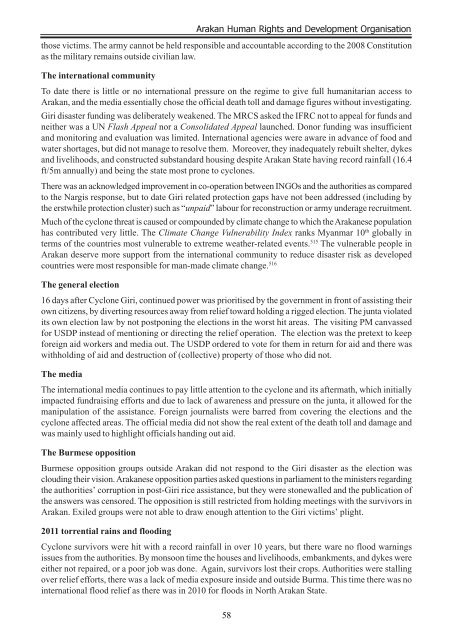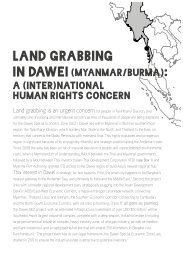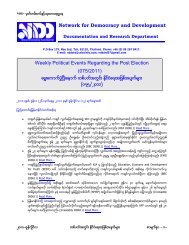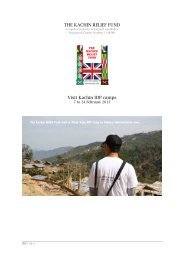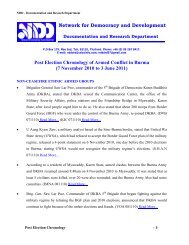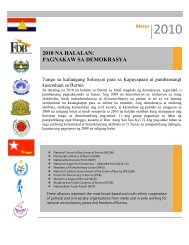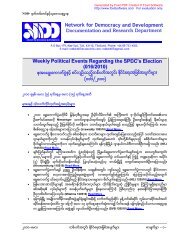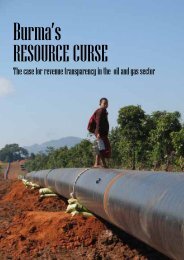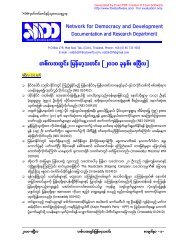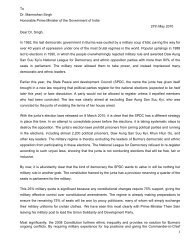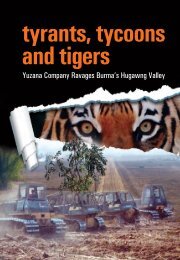Cyclone Giri - Two Years On - Burma Action Ireland
Cyclone Giri - Two Years On - Burma Action Ireland
Cyclone Giri - Two Years On - Burma Action Ireland
Create successful ePaper yourself
Turn your PDF publications into a flip-book with our unique Google optimized e-Paper software.
Arakan Human Rights and Development Organisation<br />
those victims. The army cannot be held responsible and accountable according to the 2008 Constitution<br />
as the military remains outside civilian law.<br />
The international community<br />
To date there is little or no international pressure on the regime to give full humanitarian access to<br />
Arakan, and the media essentially chose the official death toll and damage figures without investigating.<br />
<strong>Giri</strong> disaster funding was deliberately weakened. The MRCS asked the IFRC not to appeal for funds and<br />
neither was a UN Flash Appeal nor a Consolidated Appeal launched. Donor funding was insufficient<br />
and monitoring and evaluation was limited. International agencies were aware in advance of food and<br />
water shortages, but did not manage to resolve them. Moreover, they inadequately rebuilt shelter, dykes<br />
and livelihoods, and constructed substandard housing despite Arakan State having record rainfall (16.4<br />
ft/5m annually) and being the state most prone to cyclones.<br />
There was an acknowledged improvement in co-operation between INGOs and the authorities as compared<br />
to the Nargis response, but to date <strong>Giri</strong> related protection gaps have not been addressed (including by<br />
the erstwhile protection cluster) such as “unpaid” labour for reconstruction or army underage recruitment.<br />
Much of the cyclone threat is caused or compounded by climate change to which the Arakanese population<br />
has contributed very little. The Climate Change Vulnerability Index ranks Myanmar 10 th globally in<br />
terms of the countries most vulnerable to extreme weather-related events. 515 The vulnerable people in<br />
Arakan deserve more support from the international community to reduce disaster risk as developed<br />
countries were most responsible for man-made climate change. 516<br />
The general election<br />
16 days after <strong>Cyclone</strong> <strong>Giri</strong>, continued power was prioritised by the government in front of assisting their<br />
own citizens, by diverting resources away from relief toward holding a rigged election. The junta violated<br />
its own election law by not postponing the elections in the worst hit areas. The visiting PM canvassed<br />
for USDP instead of mentioning or directing the relief operation. The election was the pretext to keep<br />
foreign aid workers and media out. The USDP ordered to vote for them in return for aid and there was<br />
withholding of aid and destruction of (collective) property of those who did not.<br />
The media<br />
The international media continues to pay little attention to the cyclone and its aftermath, which initially<br />
impacted fundraising efforts and due to lack of awareness and pressure on the junta, it allowed for the<br />
manipulation of the assistance. Foreign journalists were barred from covering the elections and the<br />
cyclone affected areas. The official media did not show the real extent of the death toll and damage and<br />
was mainly used to highlight officials handing out aid.<br />
The Burmese opposition<br />
Burmese opposition groups outside Arakan did not respond to the <strong>Giri</strong> disaster as the election was<br />
clouding their vision. Arakanese opposition parties asked questions in parliament to the ministers regarding<br />
the authorities’ corruption in post-<strong>Giri</strong> rice assistance, but they were stonewalled and the publication of<br />
the answers was censored. The opposition is still restricted from holding meetings with the survivors in<br />
Arakan. Exiled groups were not able to draw enough attention to the <strong>Giri</strong> victims’ plight.<br />
2011 torrential rains and flooding<br />
<strong>Cyclone</strong> survivors were hit with a record rainfall in over 10 years, but there ware no flood warnings<br />
issues from the authorities. By monsoon time the houses and livelihoods, embankments, and dykes were<br />
either not repaired, or a poor job was done. Again, survivors lost their crops. Authorities were stalling<br />
over relief efforts, there was a lack of media exposure inside and outside <strong>Burma</strong>. This time there was no<br />
international flood relief as there was in 2010 for floods in North Arakan State.<br />
58


